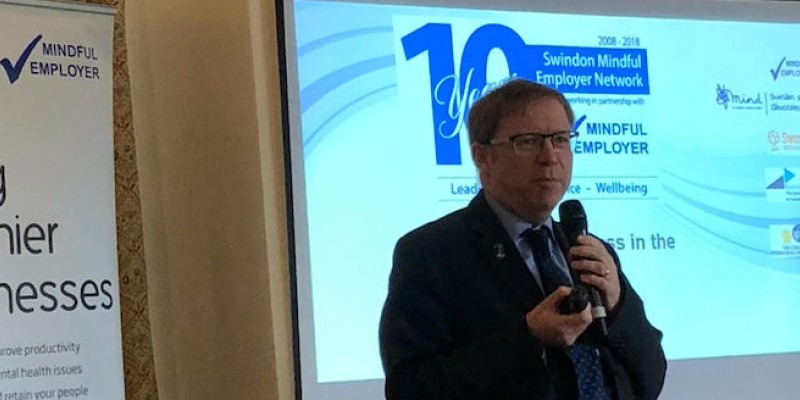
Following a highly successful relaunch event back in October, more than 100 representatives of Swindon’s biggest employers attended the first Swindon Mindful Employer Network (SMEN) event of 2020 at Wrag Barn Golf Club.
The event, which is delivered by Business West and Swindon and Gloucestershire Mind and funded by Swindon Borough Council, teed off with an introduction from SMEN chair Melanie Richens, who began by reflecting on the role of employers in helping employees to overcome their mental health issues and return to work more quickly following a period of absence.
Melanie spoke candidly about the contrasting experiences of employees whose employer’s maintained open dialogue throughout a period of sick leave and those that did not, suggesting that the former approach was much more likely to yield a positive outcome for both individuals and organisations. Stressing the importance of not letting employees simply ‘drift away’ when suffering with mental health issues, Melanie quoted statistics from Deloitte, which puts the total yearly cost of ill mental health to UK employers at £45bn. This staggering figure not only includes the cost of work days lost to absence and poor performance, but also the cost of recruiting and training replacement staff when employers fail to act and stop mentally ill employees ‘drifting away’.
The first guest speaker of the morning, Rosie Runciman, then took to the stage. The former Newsnight and the BBC World Service editor, set up Sound Doctor with BBC colleague Dominic Arkwright in 2011 to improve quality of life for people with long-term mental and physical health problems through easily accessible, high quality audio and video content. Rosie proceeded to show a series of Sound Doctor films covering wide range of issues affecting wellbeing in the workplace and quoted a number of case studies detailing the experiences of NHS trusts up and down the country. Rounding off her presentation, Rosie provided a poignant reminder that 57% of long-term absence from work is stress-related as well as citing a recent survey that showed employees would rather disclose having diarrhoea than a mental health issue to their employer.
Following a short coffee break, Paul Farmer CBE, CEO of national mental health charity Mind, spoke at length about his organisation’s efforts to improve mental health and wellbeing in the workplace on a national basis. Mind were among the first UK charities to take mental health in the workplace seriously said Paul, having put it firmly on the agenda back in 2010. Reflecting on the progress that has been made in the last 10 years, Paul said the conversation around mental health generally had become more open, before suggesting that workplaces have a duty of care in terms of increasing understanding and awareness of mental health – given that majority of us didn’t learn about it in school. He then offered a compelling business case for doing so, highlighting the fact that more than 300,000 people a year leave or are signed off from work due to poor mental health. On average this costs employers £1,500 per employee per year Paul continued, arguing that employers can and must do better before he detailed some of the steps Mind has taken to improve and safeguard the mental health of its 500 employees nationally.
One of the key interventions Mind has instigated is to introduce Wellness Recovery Action Plans (WRAP) as part of its appraisal process. The rationale behind using WRAP plans Paul explained is the fluctuating nature of mental health over time. By giving employees the opportunity to disclose their mental health problems at regular intervals, the charity has a structure in place to provide employees with any necessary ongoing support. Paul brought his presentation to a close by describing Mind’s approach as yielding more positive results when compared to the ‘fruit and pilates approach to mental health’, which has a tendency to oversimplify the prevention and treatment of mental health problems and downplay the role and responsibilities of employers.
After a short Q&A session, Debbie Jennings of Royds Withy King gave a brief introduction to mindfulness in the workplace. Debbie began with a quick primer on mindfulness and its potential benefits to employers, before taking a detailed look at how mindfulness techniques have successfully been implemented at Royds Withy King. Since measures were implemented in 2018, staff satisfaction had increased by 17% noted Debbie, before leading a practical session to give a taster of mindfulness techniques in a workplace setting.
Melanie Richens returned to the stage offer some concluding thoughts and to remind the Network of the next Time to Talk Day-themed event on 11 May.
- Log in to post comments
